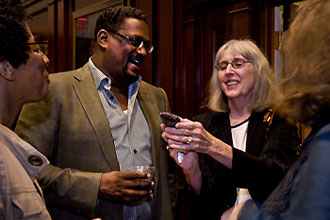Trailblazing Faculty Promote Service-Learning Courses
Service learning is a natural extension from the classroom into the community, and psychology faculty members at Tulane University have led the way. Research has shown that service-learning courses engage students, encourage creative thinking and increase the student retention rate.

Barbara Moely, a professor emerita, reconnects with Michael Cunningham, executive director of the new Center for Engaged Learning, at an event honoring both psychology faculty members on Nov. 18. (Photo by Paula Burch-Celentano)
“Service learning has been impressive in increasing student awareness of the larger society in which they live,” says Barbara Moely, professor emerita of psychology and founder of the service-learning office at Tulane, a precursor to the Tulane Center for Public Service. Her research has shown that service learning has produced “more sensitivity to civic engagement, civic responsibility and the role of the citizen.”
Michael Bernstein, Tulane University provost, recently renamed the university's annual service-learning teaching award in Moely's honor.
At an event on Nov. 18, Michael Cunningham received the first Barbara E. Moely Service Learning Teaching Award. Cunningham, an associate professor of psychology and of African and African Diaspora Studies, is the executive director of the new Tulane Center for Engaged Learning and Teaching.
Moely and three other psychology faculty members introduced service-learning courses at Tulane in 1997.
“We were doing interesting things and talking about them in class, so it seemed it would be a worthwhile experience for the students to have direct experience with the community,” Moely says.
Moely recently received a Distinguished Researcher Award from the International Association of Researchers on Service Learning and Community Engagement. Although she retired from teaching in 2004, Moely remains active in research about service learning.
Since 2006, Moely has conducted an ongoing study about the Tulane public service graduation requirement and students' perceptions of it. She is finding that students express positive views of the requirement, with many stating they want to do more than the required amount of public service. These views appear to persist as students progress toward degree completion.
“Service learning enhances the academic experience, increasing motivation and student interest in subject matter as they see it in action,” Moely says.
